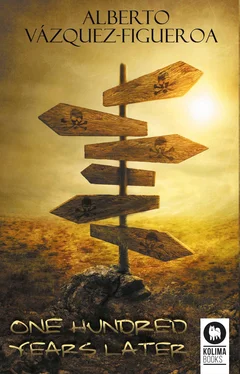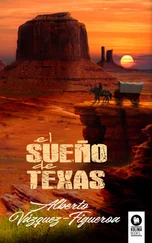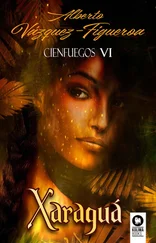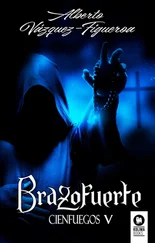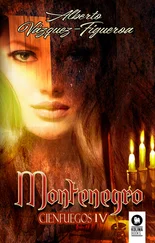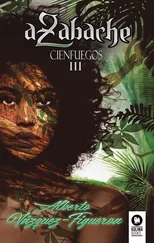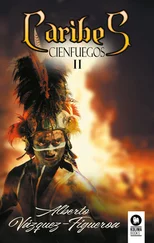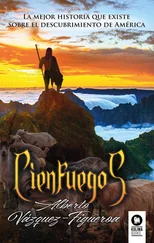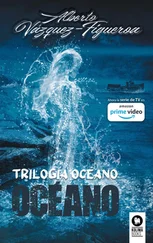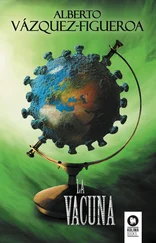At first, many students decided that in times of epidemic, it was unwise to attend those classes where they dissected animals considered to be dangerous. Soon after, they stopped attending at all because they were either dead or seeking refuge in remote places. Still, Óscar carried on going with the hope that men as brilliant as Mr. Dionisio would eventually win the battle to those beings who were considered to be merely “smart”.
Eventually, there was barely anyone left at university, and seeing an old man wandering around campus in company of an attentive student, became a strange sight. However, until their species finally disappeared, there would always be a human ready to teach and another willing to learn.
Such disposition had always been at the essence of humans, just as the ability and speed at which they assimilate knowledge had set them apart from other beings.
Chapter III
From far away came an awful screech, and when she leaned out the window her happiness was immense, because there, sitting on the chest, was her heroine showing off her skills with the accordion.
Aurelia ran towards the fence but her father held her back.
Her mother and uncle also stopped ten yards away from the entrance.
“Hey, kiddo!” cried Samuel at the newcomer.
“Hey, all!” she replied as she stopped playing, which was always a relief for the audience’s ears. “How are you?”
“Good, for now. Where’ve you come from?”
“Everywhere. Nothing stops me these days,” she said pointing at the fence, “except for that.”
“You know we can’t let you in.”
“I know. But I need some clothes, food and a few other things. I’ve moved into the village and am living in the Mayor’s house now.”
“Dead?”
“Not sure. The place is empty.”
“And what are you going to do in the village?”
“Live while we can, that’s the plan. I’ve got an Italian boyfriend now. He’s a violinist and is writing a symphony about the sickness.”
“What’s he doing that for? A symphony about this damned disease?” her-sister-in law asked.
“So that his grandchildren may listen to it one day, if he ever has them; because he believes that this evil will eventually disappear just like the Spanish influenza did all those years ago.”
“He’s too optimistic.”
“That’s the Italian blood in him. By the way, don’t forget to get my red skirt and the striped jumper.”
“You think you’ll make it?”
“If you’re managing then we can try too, although we’d appreciate some rabbits and chickens. We’ve got room to breed them.”
“A third of all the stuff we’ve got here belongs to you.”
“I know that, big guy, and if things go well, I’ll take a cow one day, but I better get going. It’s getting dark and it’s a long way home. I’ll come back tomorrow to pick up the stuff.”
“See you, kiddo!”
“See you.”
Back inside the house, Aurelia ran to the library and searched in her father’s old encyclopedia.
For years now, ever since her uncle Samuel bought their first large and heavy computer, which soon became an endless source of information, those twenty volumes bound in green leather had become a part of their home decoration; the reminder of a past that would never return. But now, without electricity to feed the machines, computers had earned that space as remnants of a time gone.
***
One dreadful evening, while she watched her favorite quiz shows, she complained to her mother:
“Mom, the light’s gone.”
“It’s not gone, darling, it’s just not coming anymore.”
“And what’s the difference?”
“Well, light, in other words, electricity, is not something that belongs to us and that can suddenly decide to pack up and leave; it belongs to others and they send it to us under the condition that we pay them for it.”
“Gosh, you always have to say things in a certain way. So, what do we do now?”
“We wait.”
But as much as they waited, “light” never returned and computers and phones ceased to work, so they went back to the ancient encyclopedia, digging up its corpse from the niche where it had lied for so long.
Its pages were yellowish, its spine was about to fall and the annoying dust that had accumulated in between its paragraphs made her sneeze. And yet, there it was, serene, unchanging, and zealously guarding the information it had been entrusted with ninety years before.
The pandemic known as “Spanish influenza” was of unprecedented gravity and, unlike other diseases which mostly affect children and the elderly, many of its victims were young people, adults and animals. It is considered the most devastating epidemic in History, killing between 40 and 100 million people in just one year.
The disease was detected for the first time in Kansas in March of 1918, although in the previous autumn there had already been a wave of North American military camps. At some point during the summer of that same year, the virus went through a series of mutations that transformed it into a lethal infectious agent. The first confirmed case of that mutation was registered in August of that same year at the French port to which American troupes arrived during the Great War.
It was given the name Spanish Influenza because of the attention it received in the Spanish press compared to the rest of Europe. Spain was not involved in the war, hence the country did not censure that information.
With the objective of studying the disease, scientists used samples of tissue from frozen victims, but given the virulence of the outbreak and the possibility of an accidental leak, certain controversies exist regarding this form of research. One of the hypothesis was that the virus killed through a storm of cytokines, which explained its extremely grave nature and the uncommon age profile of its victims.
Its mortality rate remains unknown but it is estimated that around 10% and 20% of people infected perished. With around one third of the world’s population infected, this rate indicates that between 3% and 6% of the world’s entire population died. Influenza could have killed 25 million people in its first 25 weeks. Certain calculations indicate that between 40 and 50 million people died, while today it is thought that the number is somewhere between 50 and 100 million. It is also hard to compare it to other pandemics of influenza from which it is impossible to obtain any information today.
During the summer of 1920, Spanish Influenza disappeared everywhere all at once and without any possible explanation.
She stayed very still, deep in thoughts or perhaps stunned by what she had just read. These were numbers that forced one to reflect on the fragility of beings who considered themselves to be at the peak of evolution, but who suddenly fell into an abyss from where it took humanity years to climb out. The abyss in which it was now her turn to live seemed endless and she had almost broken into tears when someone knocked on her door. She heard her uncle asking for permission to get in. He sat down at the feet of her bed and patted her with the same affection he would have felt if she been his own daughter.
Samuel and Tatiana were married for less than a year when she died of cancer and according to what her mother had told her, her uncle had been very close to dying of sadness.
“Scared?” he asked.
“Very.”
“Do you think you can overcome it?”
“What else can I do?”
“You shouldn’t overcome your fear because you’ve no alternative, but because you’ve got enough strength to cope with any obstacles. These are hard times in which we’ll have to do things that disgust us but which we’re not guilty of because we had no choice. Have I ever told you the story about the cannibals at the lighthouse?”
Читать дальше
